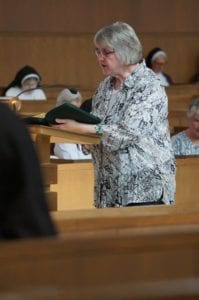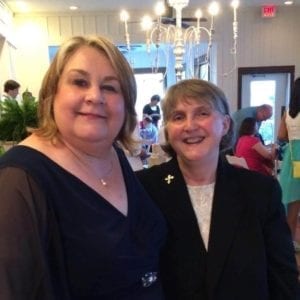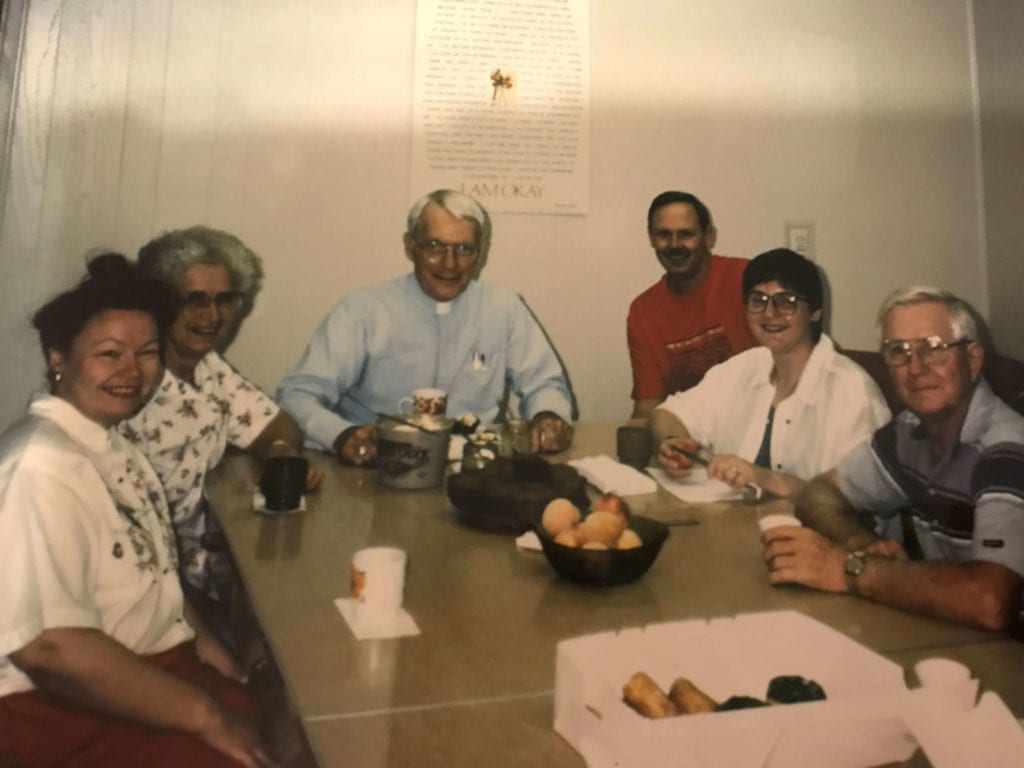Photo: Susan Dickey, second from right, enjoys breakfast with the parishioners gathered for morning prayer at the cathedral in Lubbock, Texas. (Courtesy of Sister Susan Karina Dickey.)
This is the second of three stories about Sister Susan Karina Dickey, OP, who currently serves as the Vice President for Mission Integration at St. Dominic's Hospital in Jackson, Mississippi. Follow along to be inspired by the impact of Sister Karina's ministry on hundreds of lives in one of the most challenging of Catholic healthcare ministries. Read the first story here.
Susan Dickey had a master’s degree under her belt and Dominican life was still an undreamed-of future when she began her professional career as a curator for the Indiana State Museum.
During those days, she says, her prayer life took an unpredictable turn. Her faith journey had already taken her from her home in the Lutheran church to profession of faith as a “high church” Episcopalian, she says. And about six years later she began to feel a call to Catholic sisterhood.
“For the first time in my life I began to pray every day to God to asking ‘God, show me what my call is, show me what you have ahead for me.’”
Sister Karina also had—and has—an insatiable desire for learning. Soon she sold her Indiana home and relocated to Lubbock, where, at Texas Tech, she concentrated her doctoral research on the American West and—in congruently—medieval history. It was through her medieval history studies that she encountered a biography of the 14th century Dominican lay woman and mystic St. Catherine of Siena, who beautifully refers to Jesus as “Gentle First Truth.”
"I found my niche at St. Dominic's."
“That’s when I knew I had an affinity for the Dominicans,” she recalled. Catherine’s intense relationship with Jesus Christ resonated with her. In 1991 she was received into full communion with the Catholic Church during the Easter Vigil at a Lubbock Catholic parish.
Susan’s ability to follow her Dominican heart was still almost four

years off. Lubbock, Texas is not Springfield, Illinois. She began a discernment process with the help of her parish priest and looked at other Dominican communities before deciding to come to Springfield, closer to her Midwest origins. “I perceived a loving spirit in the Springfield Dominicans,” she said, and she loved the fact that we sing the daily Liturgy of the Hours.
After profession of vows and a few years of adjunct teaching in Catholic higher education, Sister Karina was hired to write a history of the Diocese of Springfield-in-Illinois, then stayed on as the diocesan archivist. “That’s when I realized I liked using historical documents more than I liked managing them,” she jests.
Reading Facts
She shares a story about her research into Father Augustine Tolton, the first publicly acknowledged Black priest in U.S. history, to illustrate her understanding that seeking truth requires more than “facts.”
While working for the diocese, she discovered that Father Tolton’s mother had loaned money to his parish. “That is a ‘fact’ I can access” she said. “From that fact I can make some inferences that tell a deeper—and perhaps truer—story. The fact tells me she had more resources than she needed to live day to day. She could afford to make a loan, and from that I can infer that she—formerly a slave who started a life in freedom with practically nothing—worked hard and managed wisely. But more than that, she had a meaningful relationship with the parish and with her faith. Doesn’t that hold a deeper access to truth than the simple fact?”
Sister Karina’s meticulous approach to studying “facts” and the integrity of truth have been essential in her ministerial life. In 2008, nearing the completion of a master’s degree in healthcare mission, she began her position as director of mission integration at St. Dominic Hospital, the longest-lived healthcare ministry of the Springfield Dominicans.
Though the sponsorship of the hospital was transferred to the Franciscan Missionaries of Our Lady of the Lake in 2019, Springfield Dominican Sisters continue to minister there.
“I found my niche at St. Dominic’s,” she said. “The kind of work I do in mission integration brings together the academic and practical application.”
Since 2014, as Vice-President for Mission Integration, Sister Karina is responsible for providing mission-based training for St. Dominic’s boards and for a staff of about 3,000. She is also executive sponsor for the ministry’s antiracism team.
Protecting Human Dignity

“Working in health care brings you right up against the assault on human dignity,” she says, whether the cause is disease, aging, or lack of access. These things affect people in the United States and around the world and are symptoms of systemic racism.
“In Catholic health care we are always striving to mitigate the effects lack of access to services and pharmaceuticals. It is very gratifying to me to be part of a community—a ministry—that addresses life and death matters.”
She says the schooling she and most of us in the congregation have had on racism has given her a window into the healthcare disparities. “With COVID we know that the mortality rates are higher for African Americans, for Native Americans than for whites,” she says. “We are seeing that in Mississippi and across the country. Those are the facts on the ground.”
“Why is that?” she asks, and answers. “In part it has to do with access for people when they are well, access to medications after diagnosis…there are many factors. Being on an antiracism team has helped me appreciate that disparities are real and to ask, “What can we do about it?”
St. Dominic’s Antiracism Team began a Racial Equity Report Card with the patient experience, human resource, and clinical sections. For example, on national patient surveys the scores on courtesy for People of Color and whites over a period of three years were very similar. That suggests equitable treatment.
“Because of the current racial unrest, more white people are beginning to see that racism is real, it does persist, and there is more to dismantling it than being a nice person and acting with good will.
“Absolutely, those things are vital” she says, adding “It does still take that look at the systemic dimensions.”
How to Help
Sister Karina’s story is a window into the challenges facing Catholic institutions as they strive to live the gospel.
A gift made today to the Dominican Sisters of Springfield will be put to use right away as Sister Karina and all of our sisters in active ministry continue their mission in service of gospel justice.
Your gift to the Dominican Sisters of Springfield is a contribution to the abundance Sister Karina and all our sister have to share with those among whom they minister. A gift from you will:
Strengthen efforts to listen to and journey with those who are marginalized
Seed opportunities for authentic transformation so needed for hope at this time
Support training for coworkers in our sponsored high schools and at Sacred Heart Convent
Shape our work toward racial equity.
Made a gift already?
Thank you! Your generosity is much appreciated.
If you’d like to give today you can use this secure online portal to do so. May God bless you and yours and keep you safe and healthy in these challenging times.


